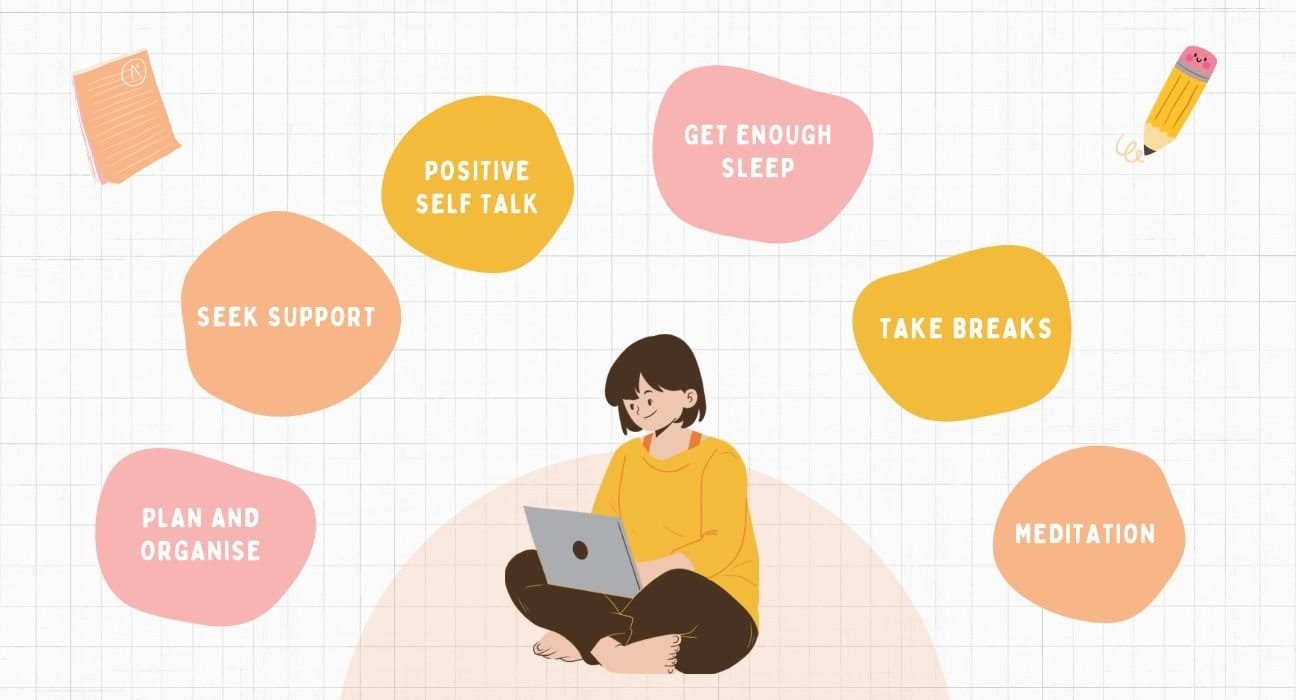With board exams right around the corner, the stress level of students in classes 10th and 12th is through the roof. It is no secret that the board exams in India are seen as a paramount measure of one’s intelligence. Board examinations are the public examinations that are conducted at the end of the completion of Secondary and Senior Secondary Education. State Board, Central Board of Secondary Education (CBSE) And Council for the Indian School Certificate Examinations (ICSE) are the educational boards in India that conduct these board exams for classes 10 and 12. The scores achieved in XII exams are considered very important for further admission into universities.
Read More: Math Phobia: Causes, Symptoms, Ways to Overcome
Stress and Anxiety during Board Exams
Both students and their parents alike are extremely stressed during these months. A lot of mental pressure is put on the students as they are made to believe that this examination will pave their future. It is seen as a measure of intelligence and also helps them later on to choose their stream of interest in higher classes. But this redundant stress does not help with their performance; in fact, it may only go on to hamper their performance. In this way, the students experience a lot of distress.
Distress, as defined by the American Psychological Association, is the negative stress response, often involving negative affect and physiological reactivity: a type of stress that results from being overwhelmed by demands, losses, or perceived threats. It can pose serious health risks for individuals.
Read More: How can the Indian education system, support the mental well-being of students?
How does Examination Stress Manifest?
The extreme stress caused by board examination can have many physical, emotional, behavioural and even cognitive symptoms. While some level of Anxiety is expected and even beneficial during the examination period, it becomes a problem when these symptoms escalate to a high level and interfere with one’s day-to-day tasks.
- Physical symptoms: The physical symptoms may manifest as constriction of the throat or mood swings. You may find yourself feeling irritable or sad without any reason. You may also experience dull aching headaches, muscle tension, inability to sleep, rapid heartbeat, excessive sweating and shortness of breath.
- Emotional symptoms: The emotional symptom of stress can be displayed as an ongoing apprehensive feeling about the upcoming examination. You could experience sudden, unexplained shifts in mood, low self-esteem and maybe even crying spells or bouts of extremely low mood.
- Behavioural symptoms: behavioural symptoms could mean procrastinating due to feeling overwhelmed, avoiding studying because of stress, or social withdrawal. Changes in appetite may be noticed, and even small compulsive habits such as nail-biting.
Read More: The Psychology of Procrastination: strategies to boost Productivity
- Cognitive symptoms: Stress can also have cognitive symptoms. You might experience indecisiveness. It may even be severe enough to cause forgetfulness – you may quickly forget whatever you sat down to study. You may experience racing thoughts that can be difficult to control and also find yourself constantly engaging in negative self-talk- always doubting and criticising yourself.
Read More: Talking Back to Your Inner Critic
It’s important to recognize these symptoms and address them proactively to prevent them from escalating.
Managing exam stress and anxiety

It is very common among students taking their board exams to experience examination stress. Learning to deal with this stress is an important skill for all students to inculcate to help them perform their best. The following strategies may help to manage and reduce exam stress-
- Plan and Organise: Organising your time and study material becomes very important, especially when your exams are near. It gives structure to your study sessions and takes away the feeling of being overwhelmed.
- Healthy Lifestyle: Practising a healthy lifestyle is paramount in these times. It is important to avoid junk food and eat a good, nutrient-rich diet. Make sure to take time out daily for a little bit of exercise; it helps greatly to relieve stress. Getting enough sleep is also important.
- Relaxation Techniques: Relaxation techniques such as deep breathing exercises, meditation and mindfulness exercises can be a great way to keep yourself grounded and to prevent your mind from wandering too much.
- Visualise Success: Visualising your success can help build confidence and reduce exam-related anxiety. Imagining yourself performing well may give you the confidence and motivation to perform well.
- Time Management: Managing your time can help avoid procrastination. Allocating time for all activities and studying may help you feel in control and help avoid burnout.
Read More: The Psychology of Time Management and Its Importance
- Take breaks: Remember, taking breaks always helps to calm you down. It can be overwhelming to constantly be sitting in front of your books. Taking breaks to do what you like can help you stay motivated and also decrease mental pressure.
- Stay positive: perhaps the most important point is to always stay positive. Your attitude can greatly influence your performance. If you stay positive and believe in yourself, things will work out.
Remember, board examinations are only a part of life; they are not the end. Stay positive and believe in yourself, everything else will fall into place.
References +
- https://en.wikipedia.org/wiki/Board_examination
- https://dictionary.apa.org/distress













Leave feedback about this